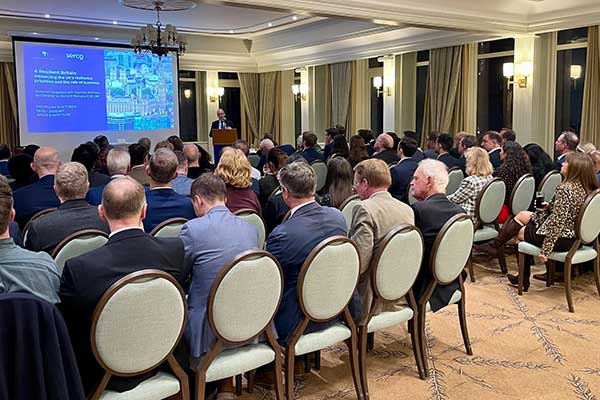By Laura Michelon, Marketing Manager, Resilience First
Considering the temperamental weather the UK has had this season, we were delighted to find the sun shining brightly for our spring reception, held on the 25th April at Control Risks’ head office, overlooking the Thames by London Bridge. The beautiful sunset was a great start to a thought provoking and insightful evening in the presence of some of the most resilient minds in the UK including our Chair, Rick Cudworth.
Before delving into the key take-aways from the evening, we would like to firstly thank the amazing team at Control Risks for supporting us in delivering a brilliant event. A special thanks goes to Jean Devlin, Partner at Control Risks, for interviewing Rick during the fireside chat, in the absence of Martyn Link, our Executive Director, who unfortunately was stuck in Scotland. Nonetheless he was there in spirit, and you will have the opportunity to meet him at our event during London Climate Action Week at the end of June (watch this space!)
For those who don’t know Rick, he is a senior advisor in organisational resilience and strategic risk mitigation and among the many things he does, he is leading the current revision on ISO 22316, which is a standard on organisational resilience.
Jean started the interview asking what has changed since Covid for Rick, and I believe his answer resonated with most of the audience – the use of the word resilience which has become overused and arguably misapplied as well.
Since Covid many organisations have become more resilient simply because of the pandemic, surprisingly they worked out different ways to continue to deliver what they were doing, as for most of them pandemic wasn’t in their business continuity plans and just wasn’t in their thinking pre-Covid. Nevertheless, at senior levels in organisations, there is still a confusion about what resilience is, what it means for an organisation and what they need to do about it.
“Resilience isn’t just about risk management, actually, fundamentally it’s about strategy. It’s about business model design, and it’s only thirdly actually about risk management. If you start much earlier in the process with strategy (when building) a business model, you would be much more likely to design in resilience, and make resilience improvements in the way you engineer your organisation to operate, and the way you have your finance arrangements, that is far better. Then you can manage risk.” commented Rick.
And he continued: “As an organisation you can only be as resilient as the sector within which you operate, or the system within which you are operating. If that isn’t resilient, you will suffer the consequences as an organisation. You see it in the financial sector. One bank fails, it can collapse all the banks. So, it’s exactly the same in many sectors (to have) that inherent dependency. Organisations that get this must show the leadership to bring other organisations on that journey as well.”
He suggested to consider what the National Infrastructure Commission has recommended in terms of improving resilience:
- Organisations should have a long-term resilience strategy and should regularly scenario stress test their resilience and their strategy.
- Regulators should have a statutory responsibility for resilience and that should be clear and explicit to all regulators.
- There should be outcome based standards for resilience, which set out what to expect from organisations in terms of resilience.
Last year the British Standards Institution published a revised standard on organisational resilience, BS 65000. This sets out organisational resilience against five capitals. Rick said: “Three are really important. Three legs of a stool. So think of a three-legged stool to be organisationally resilient. You need financial, operational, and reputational resilience. And those three support each other and support the stool. If one of them is weak, as soon as it gets hit, the organisation can collapse.” An organisation should understand its resilience also against the other two capitals: human capital and environmental resilience.
One other vital question that Jean asked was how technology facilitates resilience and Rick strongly believes that technology actually saved the day during the pandemic. No organisation would have been able to work from home without the technology currently available. Although we shouldn’t rely on it, as he commented: “One break in the technology, one failure may cause huge disruptions. Technology can enable resilience, but also it introduces other resilience challenges.”
It’s thanks to technology that we now have at our disposal a big amount of data to support decision making, Rick added: “We came through a pandemic that was a crisis that lent itself to data-driven decision making. But we just need to be careful about how we use data. One thing I am seeing is that organisations are starting to look at what leading indicators there are in the operations area. Are these being measured? Do we understand where a threshold is and what we would do if we start to hit that threshold? It’s sort of a real time form of resilience. So, if some of these metrics drop, then they are ready to take some action. So that type of data driven understanding of trends and where they might be going in the future is important.”
We hope that the insights shared during the reception will continue to foster resilience and innovation. Thank you again for joining us and being a part of our incredible community of resilient leaders!




